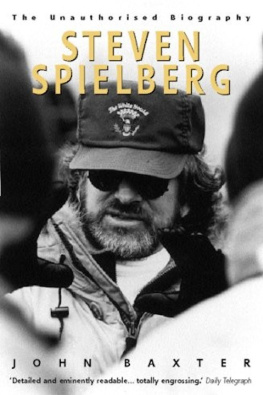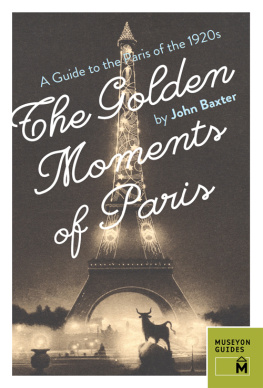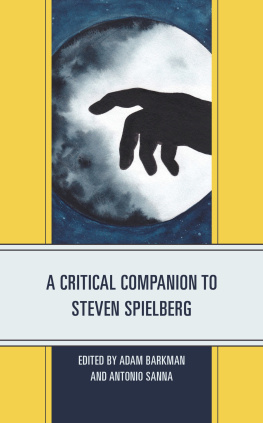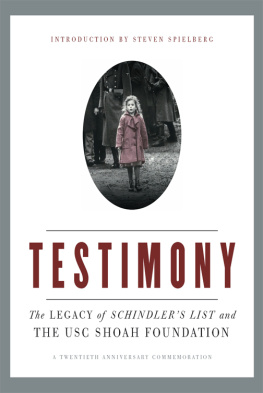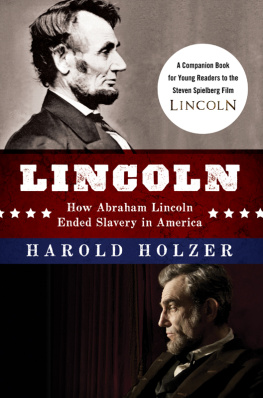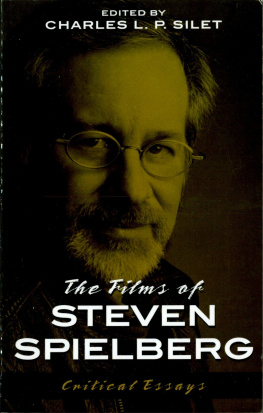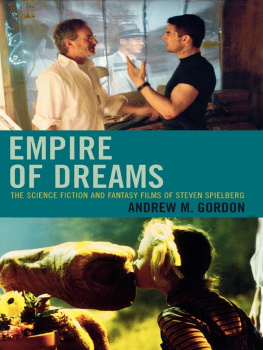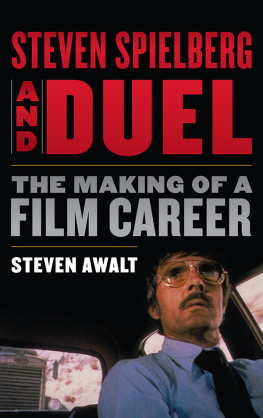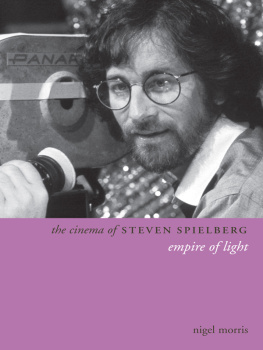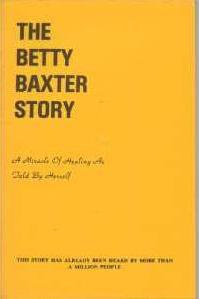John Baxter - Steven Spielberg
Here you can read online John Baxter - Steven Spielberg full text of the book (entire story) in english for free. Download pdf and epub, get meaning, cover and reviews about this ebook. year: 2014, publisher: Harper Collins, genre: Detective and thriller. Description of the work, (preface) as well as reviews are available. Best literature library LitArk.com created for fans of good reading and offers a wide selection of genres:
Romance novel
Science fiction
Adventure
Detective
Science
History
Home and family
Prose
Art
Politics
Computer
Non-fiction
Religion
Business
Children
Humor
Choose a favorite category and find really read worthwhile books. Enjoy immersion in the world of imagination, feel the emotions of the characters or learn something new for yourself, make an fascinating discovery.
- Book:Steven Spielberg
- Author:
- Publisher:Harper Collins
- Genre:
- Year:2014
- Rating:3 / 5
- Favourites:Add to favourites
- Your mark:
- 60
- 1
- 2
- 3
- 4
- 5
Steven Spielberg: summary, description and annotation
We offer to read an annotation, description, summary or preface (depends on what the author of the book "Steven Spielberg" wrote himself). If you haven't found the necessary information about the book — write in the comments, we will try to find it.
Steven Spielberg — read online for free the complete book (whole text) full work
Below is the text of the book, divided by pages. System saving the place of the last page read, allows you to conveniently read the book "Steven Spielberg" online for free, without having to search again every time where you left off. Put a bookmark, and you can go to the page where you finished reading at any time.
Font size:
Interval:
Bookmark:
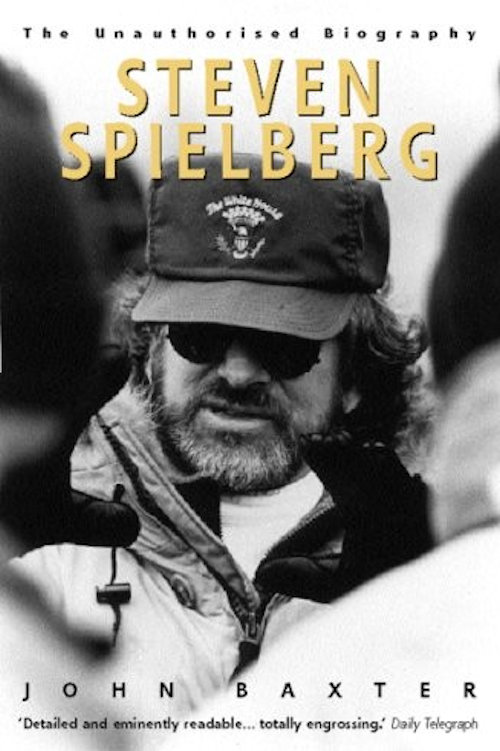
The Unauthorised Biography
STEVEN SPIELBERG
JOHN BAXTER

Further reviews for Steven Spielberg:
Diligent, perceptive and with every available anecdote
SIMON HATTENSTONE , Guardian
riveting retains a healthy objectivity throughout his enthralling account
PENELOPE DENING , Irish Times
a film-lovers book, a review of a remarkable era, an exhaustive filmography a movie about the evolution of Hollywood, with Spielberg as the central character
JEREMY LESTER , Jewish Chronicle
Baxter may have a blockbuster on his hands.
RICHARD E. GRANT , Sunday Times
highly entertaining, packed with interesting information. If you want to know how a Spielberg film was made, what shenanigans went on during the making, or who fell out with whom, it is all here.
WILLIAM RUSSELL , The Herald (Glasgow)
Its usefulness lies in Baxters shrewd assessment of Spielbergs relationship with the wider context of the entertainment industry in general and Hollywood power-politics the account of Spielbergs unsettled early years is illuminating in terms of his later preoccupations.
HUGO DAVENPORT , Sunday Telegraph
Baxter is quietly professional and makes good use of the copious interviews Spielberg has given throughout his career.
ANTHONY QUINN , The Observer
A very valuable book the thing that most impresses in his book is the calm, careful and nearly gentle way in which it builds up our disquiet that the movie kingdom and our society as a whole should be so ordered that Steven Spielberg is its Gatsby, its Kane, and such a shining young example it is Baxters most intriguing point that Spielberg not only caters to youthfulness, but extends and preserves it What is so clever, I think, is Baxters sense of a man too narrowly focused to amount to a villain Baxters success is beyond question.
DAVID THOMSON , Independent on Sunday
An impeccably professional film-biographer (hes already done Buuel, Fellini, Ford and is now working on Kubrick), Baxter leaves no document unrifled, no fact unchecked, no anecdote untold.
Sight and Sound
a full, frank and readable account of a man who the public regards as one of the greatest enchanters in the history of film.
STUART GILLES , Manchester Evening News
The Man Who Fell to Earth
Yesterday, upon the stair,
I met a man who wasnt there.
He wasnt there again today.
I wish that man would go away.
Traditional rhyme
T HE FORCE of American popular art lies in its directness, its simplicity, its economy of means and of scale. Analysis may uncover cultural and autobiographical references, sophistications of technique, even profundity of intellect, but the first appeal of a George Gershwin song, a Walt Disney cartoon, a Norman Rockwell painting is, and must be, commonplace delight.
Steven Spielberg embodies this tradition. His films, even the sombre Schindlers List, are machines for delighting us. Almost always they succeed in doing so. Its not hard to see why. He traffics in what authors of science fiction, his preferred form, call a sense of wonder, a heightened apprehension of physical possibilities. It has been said that the universe is not only stranger than we know but stranger than we can know. Spielberg dispels this idea. His vision, like that of the best science fiction writers, is of a welcoming, explicable place.
Writing about Ray Bradbury, whose books like The Martian Chronicles and Something Wicked this Way Comes share Spielbergs simplicity of vision and sureness of technique, the critic Damon Knight, in a passage that could well refer to Spielberg, remarked:
To Bradbury, as to most people, radar and rocket ships and atomic power are big, frightening, meaningless names; a fact which, no doubt, has something to do with his popular success, but which does not touch the root of the matter. Bradburys strength lies in the fact that he writes about the things that are really important to us: not the things we pretend we are interested in science, marriage, sports, politics, crime but the fundamental pre-rational fears and longings and desires; the rage at being born; the will to be loved; the longing to communicate; the hatred of parents and siblings; the fear of things that are not self
People who talk about Bradburys imagination miss the point. His imagination is mediocre; he borrows nearly all his backgrounds and props, and distorts them badly; wherever he is required to invent anything a planet, a Martian, a machine the image is flat and unconvincing. Bradburys Mars, where it is not as bare as a Chinese stage setting, is a mass of inconsistencies; his spaceships are a joke; his people have no faces. The vivid images in his work are not imagined; they are remembered.
In 1987, cartoonist Jules Feiffer drew a panel for the magazine Village Voice. A writing professor lauds a student for his Joycean gift of language coupled with a Hemingwayesque spareness. He goes on to compare him with Fitzgerald, Bellow, Updike, Styron, Mailer, then asks him what hes working on. A screenplay for Spielberg, the boy says airily. The professor is suddenly a beaming enthusiast. Do you know him? he demands. Whats he really like?
The public urge to know what Spielberg is really like has never abated. His personality and appearance are so unremarkable, his public statements so bland, that everyone feels there must be a secret Spielberg hidden under the ramshackle exterior.
If you were to ask Spielberg what he is really like, he would probably reply that he is just like his audience. He is like everyone. But the image of Just Plain Steve is simply one aspect of his public persona. Examine that persona, and it fragments into a jigsaw puzzle where real memories slot into fabricated ones, and where childhood enthusiasms jostle for space with the structures of corporate power.
Spielbergs indifferent communication skills dont help to explain him to his public. His voice has never quite lost the self-absorbed gabble and stammer of the teenager drunk on ideas. He has all the virtues and defects of a sixteen-year-old, one colleague remarks. Over the years hes learned to smile and to pause occasionally for others to speak, but the interpersonal still daunts him. He communicates best from behind a protective grille of technology. On that level, he radiates competence. Everyone notices it. The novelist Martin Amis almost mistook him for the man whod come to fix the Coke machine. Someone else described his image as chemistry-student-next-door. Both Amis and actor Tom Hanks compared him to the high school audio-visual assistant who alone understood 16mm projectors. (Spielberg worked his way through three years of college, in part by projecting classroom films.)
His mastery of cinema technology, what critic Pauline Kael called a film sense, is innate and effortless, his innocent flair and enjoyment disguising the complexities of what he does. I got the feeling, said Julian Glover, who acted for him in Indiana Jones and the Last Crusade, that, if he wanted to, he could have built the set. He knew as much about lighting as [director of photography] Douglas Slocombe. And he operated the camera himself. The worst sin for a Spielberg collaborator is to fail in technique. When that happens, Spielberg can be scathing. There is no, Nice try, guys better luck next time, complained one crew member. He says things like, You didnt get it right. Think about
Font size:
Interval:
Bookmark:
Similar books «Steven Spielberg»
Look at similar books to Steven Spielberg. We have selected literature similar in name and meaning in the hope of providing readers with more options to find new, interesting, not yet read works.
Discussion, reviews of the book Steven Spielberg and just readers' own opinions. Leave your comments, write what you think about the work, its meaning or the main characters. Specify what exactly you liked and what you didn't like, and why you think so.

